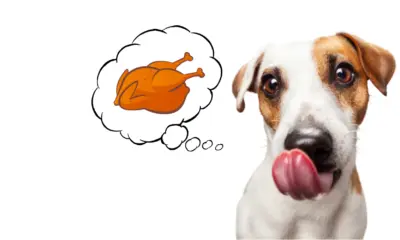Food and Nutrition
Vegetarian Diet for Dogs: A Comprehensive Guide
Are you considering feeding your adult dog a vegetarian diet? Many pet owners make this decision for ethical, ecological, or health-related reasons. But can dogs thrive on a vegetarian diet? Let’s examine the specifics of a vegetarian diet for dogs and see if it’s the best option for your dog.
What is a Vegetarian Diet for Dogs?
A vegetarian diet for dogs is a plant-based diet that excludes all items produced from animals, such as meat, chicken, fish, and dairy products. Instead, it relies on protein, carbs, and critical elements derived from plants. This diet can consist of a range of foods, including legumes, grains, fruits, and vegetables.
The Pros of a Vegetarian Diet for Dogs
Ethical considerations are one of the primary reasons pet owners move their dogs to a vegetarian diet. Numerous individuals believe it is immoral to consume animal products and wish to extend this sentiment to their dogs. The production of plant-based meals consumes less resources and generates less pollution than animal agriculture, therefore a vegetarian diet can also be beneficial for the environment.
Improved health is another potential advantage of a vegetarian diet for dogs. A plant-based diet may reduce the risk of obesity, cardiovascular disease, and several forms of cancer, according to some research. A vegetarian diet may help improve digestion and lower the likelihood of food allergies and sensitivities.
The Cons of a Vegetarian Diet for Dogs
Before making the switch to a vegetarian diet, it is essential to evaluate the possible disadvantages. One of the most difficult aspects of a vegetarian diet for dogs is ensuring that they acquire all of the necessary nutrients. Dogs are omnivores and require specific nutrients, such as amino acids and certain vitamins and minerals, which are exclusive to animal-based meals.
In addition, it might be difficult to ensure that your dog’s vegetarian food is nutritionally complete and balanced. Before making the transfer, it is essential to consult with a veterinarian or veterinary nutritionist. They may assist you in developing a well-balanced meal plan and monitoring your dog’s health to ensure that he or she is receiving all the necessary nutrients.
Choosing the Right Vegetarian Diet for Your Dog
It is crucial to find a well-balanced and nutritionally full vegetarian diet for your dog if you are considering one. This may consist of commercially available vegetarian dog food, home-cooked meals, or a combination of the two.
Look for a commercial vegetarian dog food that has been created by a veterinary nutritionist and meets the Association of American Feed Control Officials (AAFCO) adult dog nutrient profiles. Additionally, it is essential to choose a food that contains a high-quality protein source, such as soy, pea, or rice protein.
If you prefer to prepare your own vegetarian dog food, you must ensure that it has all of your dog’s vital nutrients. This can be accomplished by consuming an assortment of meals and supplements, including amino acids, vitamins, and minerals. Again, it is essential to see a veterinarian or veterinary nutritionist to ensure that your dog’s diet is nutritionally adequate and balanced.
Essential Nutrients for Dogs on a Vegetarian Diet
It is crucial to provide well-balanced vegetarian food in order to guarantee that your dog receives all the essential nutrients it needs. The following are some of the key nutrients that dogs require, as well as suggestions for ensuring that they receive enough of them on a vegetarian diet.
Protein
Protein is crucial for dogs because it provides their bodies with the building blocks necessary for tissue maintenance and repair. Dogs can obtain the essential amount of protein from plant-based sources, such as beans, grains, and soy.
Carbohydrates
Carbohydrates are a vital source of energy for dogs and also aid in regulating their blood sugar levels. Ideal for dogs, complex carbohydrates, such as those found in whole grains, give a slow and constant release of energy.
Fats
Fats are necessary for dogs because they provide a concentrated source of energy and facilitate the absorption and transfer of fat-soluble vitamins. Nuts and seeds, among other plant-based sources of healthy fats, can provide the required fats for dogs.
Vitamins and Minerals
Vitamins and minerals are necessary for a range of biological activities and are critical for a dog’s general health. To ensure that your dog receives all of the necessary vitamins and minerals, it is crucial to provide a well-balanced diet that contains a range of fruits, vegetables, and fortified foods.
Introduction to Vegetarian Diets for Dogs
The idea of a vegetarian diet for dogs may sound unusual, but many pet owners are opting to move their furry companions to a vegetarian diet for numerous reasons. Whether for ethical, environmental, or health reasons, it is crucial that a vegetarian food for dogs is well-balanced and has all the necessary elements for a healthy existence.
Nutritional Requirements for Dogs
Dogs are omnivores, which means they can consume both plant-based and animal-based diets, and their nutritional demands are satisfied by a combination of proteins, fats, carbs, vitamins, and minerals. Protein is crucial for dogs because it offers the building blocks necessary for tissue growth and repair. Complete proteins derived from animals contain all of the essential amino acids that dogs require. However, plant-based proteins are incomplete, thus it is essential to have a variety of plant-based sources in the diet in order to obtain a full spectrum of amino acids.
Fat is essential for dogs because it gives them energy and helps them keep healthy skin and a glossy coat. Carbohydrates give energy, fibre, and important nutrients and should be incorporated into a healthy diet. Vitamins and minerals are also necessary for a healthy diet since they aid in tissue formation, maintenance, and repair.
Choosing a Vegetarian Dog Food
When selecting a vegetarian dog food, it is crucial to look for goods that are balanced and comprehensive, i.e., they contain all the key nutrients your dog need. Look for AAFCO (Association of American Feed Control Officials)-approved products, which have been created to fulfil the nutritional needs of dogs. Additionally, it is essential to select goods that are suitable for your dog’s life stage, such as puppy, adult, or senior.
Homemade Vegetarian Diets for Dogs
If you wish to prepare a vegetarian meal for your dog, you should see a veterinarian or a veterinary nutritionist to ensure that it is balanced and comprehensive. A homemade diet should consist of a variety of plant-based protein sources, such as lentils, tofu, and quinoa, as well as a variety of vegetables and fruits to supply important vitamins and minerals.
Adding Supplements to a Vegetarian Diet for Dogs
Vitamin B12 must be supplemented when giving a vegetarian diet to a dog, as this nutrient is not naturally contained in plant-based foods. Vitamin B12 is essential for optimal nerve function and red blood cell production. Numerous vitamin B12 supplements are available for dogs, and your veterinarian or veterinary nutritionist can recommend the right product and amount.
Frequently Asked Questions on Vegetarian Diets for Dogs
Vegetarian dog food is a potentially controversial topic. Others are concerned about the potential health concerns and nutrient inadequacies associated with such a diet. We’ve developed a collection of frequently asked questions about vegetarian diets for dogs in order to dispel some common misconceptions and anxieties.
Is it safe for dogs to be on a vegetarian diet?
Yes, it is possible for dogs to consume a vegetarian diet if it is well-balanced and has all of the important elements that dogs need. Dogs have a distinct nutrient profile and dietary requirements that differ from those of humans, making it more difficult to maintain a balanced diet.
How do I ensure that my dog gets all the necessary nutrients on a vegetarian diet?
Choosing high-quality, nutrient-dense products that are specifically prepared to fulfil a dog’s nutritional demands is the key to a healthy vegetarian diet for dogs. This may include plant-based proteins, such as soy, peas, or lentils, as well as vitamins and minerals that have been fortified. It is also essential to see a veterinarian or a veterinary nutritionist in order to adjust your dog’s diet to their specific nutritional requirements and to monitor their health.
Are there any health risks associated with a vegetarian diet for dogs?
A poorly balanced vegetarian diet can cause a range of health difficulties in dogs, including malnutrition, intestinal disorders, and anaemia. To avoid these hazards, it is crucial to ensure that the diet contains the correct levels of all essential nutrients. A veterinary nutritionist can help you establish a balanced diet for your dog and monitor its health.
Can all dogs be on a vegetarian diet, or are some breeds better suited to it than others?
In general, all dogs can be fed a vegetarian diet if it is nutritionally enough and balanced. However, certain breeds may have nutritional restrictions or health conditions that must be taken into account. Before making modifications to your dog’s food, it is usually advisable to speak with a veterinarian or veterinary nutritionist.
Is a vegetarian diet more ethical for dogs than a meat-based diet?
The morality of feeding a vegetarian diet to dogs is a matter of opinion, and various people may hold differing views. Some pet owners believe a vegetarian diet is more moral because it avoids the use of animal products. Others contend that dogs are natural carnivores that thrive on meat-based diets. The decision to provide a vegetarian diet to your dog should ultimately be based on your own values and views, as well as the dog’s nutritional requirements.
Conclusion
A vegetarian diet can be a healthy and practical option for dogs if it is nutritionally complete and well-balanced. To ensure that the diet fulfils your dog’s specific dietary demands and avoids any health hazards, thorough planning and monitoring are necessary. If you are considering feeding your dog a vegetarian diet, you should always get the counsel of a veterinarian or veterinary nutritionist.



























